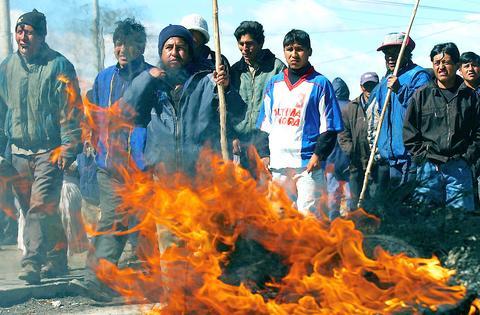Bolivians faced the unwieldy task yesterday of turning their historic referendum over the Andean nation's natural gas reserves into real policies to tighten state control over the industry.
The referendum, seen also as a vote of confidence in President Carlos Mesa, essentially asked Bolivians if they wanted to increase state participation in the impoverished nation's energy industry and export the gas abroad.
Mesa, who was installed nine months ago after his predecessor was kicked out by an Indian revolt, declared victory in the referendum late on Sunday, saying the country had backed each of his proposals.

PHOTO: AP
Early results appeared to support his claim, with the National Electoral Court's Web site showing a majority of Bolivians in support of his proposals with nearly 8.5 percent of the voting stations counted.
Unofficial counts by state and private television also showed Mesa had come out ahead in what analysts say is a vote that will lend his government legitimacy in a country increasingly divided between the rich elite and the millions of poor Indians who make up the majority of its 8 million people.
But political analysts say the referendum's questions have been phrased so ambiguously that interpreting them and enacting legislation presents another challenge for the 50-year-old leader.
Mesa has no formal political support in a Congress known for its internal squabbling.
"This is undoubtedly a victory for Mesa. But the government has only overcome its first obstacle. Now these referendum proposals must go to Congress and that will be another battle. The difficulties may have just begun," said Jorge Lazarte, a political analyst.
Fury at a US$5 billion plan to export gas via Chile, Bolivia's historical enemy, lay behind a siege of the capital by Indian groups in October in which dozens of protesters were killed. The violence led to the ouster of pro-Washington president Gonzalo Sanchez de Lozada.
Mesa, his replacement, called the referendum to appease Indians, who made nationalization a rallying cry of October's revolt. He turned the election into a vote of confidence.
Defeat in the referendum would have forced him from office and plunged Bolivia, with a history of coups, into civil unrest.
The referendum was seen as the best of the worst by foreign investors, given that a "no" vote would have plunged Bolivia into chaos. Foreign companies will have to deal with stronger state controls and higher taxes.
Oil companies with operations in Bolivia include Brazil's Petrobras, Spain's Repsol, France's Total and Britain's BG and BP.
The vote may come as a relief to Washington, which feared that more unrest in Bolivia, the world's third-largest source of coca leaf used to make cocaine, could lead to more drug smuggling from an Andean region where there is growing indigenous anger at "gringo imperialism."
The vote could also send a political signal across Latin America, where democratic leaders from Argentina to Peru face voter backlash after a decade of market reforms that many argue have benefited foreign firms and the rich.

STEPPING UP: Diminished US polar science presence mean opportunities for the UK and other countries, although China or Russia might also fill that gap, a researcher said The UK’s flagship polar research vessel is to head to Antarctica next week to help advance dozens of climate change-linked science projects, as Western nations spearhead studies there while the US withdraws. The RRS Sir David Attenborough, a state-of-the-art ship named after the renowned British naturalist, would aid research on everything from “hunting underwater tsunamis” to tracking glacier melt and whale populations. Operated by the British Antarctic Survey (BAS), the country’s polar research institute, the 15,000-tonne icebreaker — boasting a helipad, and various laboratories and gadgetry — is pivotal to the UK’s efforts to assess climate change’s impact there. “The saying goes

Police in China detained dozens of pastors of one of its largest underground churches over the weekend, a church spokesperson and relatives said, in the biggest crackdown on Christians since 2018. The detentions, which come amid renewed China-US tensions after Beijing dramatically expanded rare earth export controls last week, drew condemnation from US Secretary of State Marco Rubio, who on Sunday called for the immediate release of the pastors. Pastor Jin Mingri (金明日), founder of Zion Church, an unofficial “house church” not sanctioned by the Chinese government, was detained at his home in the southern city of Beihai on Friday evening, said

Floods on Sunday trapped people in vehicles and homes in Spain as torrential rain drenched the northeastern Catalonia region, a day after downpours unleashed travel chaos on the Mediterranean island of Ibiza. Local media shared videos of roaring torrents of brown water tearing through streets and submerging vehicles. National weather agency AEMET decreed the highest red alert in the province of Tarragona, warning of 180mm of rain in 12 hours in the Ebro River delta. Catalan fire service spokesman Oriol Corbella told reporters people had been caught by surprise, with people trapped “inside vehicles, in buildings, on ground floors.” Santa Barbara Mayor Josep Lluis

TICKING CLOCK: A path to a budget agreement was still possible, the president’s office said, as a debate on reversing an increase of the pension age carries on French President Emmanuel Macron yesterday was racing to find a new prime minister within a two-day deadline after the resignation of outgoing French Prime Minister Sebastien Lecornu tipped the country deeper into political crisis. The presidency late on Wednesday said that Macron would name a new prime minister within 48 hours, indicating that the appointment would come by this evening at the latest. Lecornu told French television in an interview that he expected a new prime minister to be named — rather than early legislative elections or Macron’s resignation — to resolve the crisis. The developments were the latest twists in three tumultuous